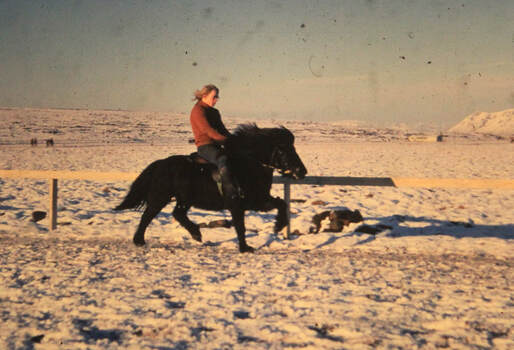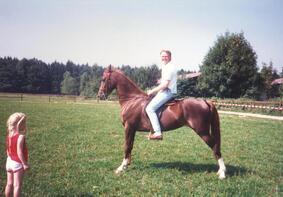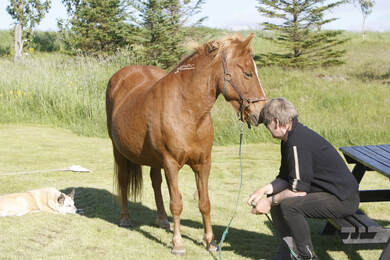The Wonder
I remember the days when I was young and seeking, around 1960-70, when we the lovers of the Icelandic horse, „knew“ to 100% that the Icelandic horse was the best horse in the whole world. This horse, with its gates, was a wonder. We felt sorry for people in other countryes to have to ride these big 3-gated horses - “poor bastards“
The truth

As time passed by, the world becoming „smaller“ with more flow of information. Gunnar Bjarnason and some young Icelandic horseman had started traveling a lot around the world, introducing the wonders of the 5-gated Icelandic horse, - and the discussions started.
Information about the origin of the gates and the fact that there are a lot of horse-breeds in the world that also have the natural talent for the gates; Tölt and Pace ,was put on the table. This became like a „shock“ to Icelandic horse-lovers. „Our horse is not a „unique“ animal. „They“ (the foreigners) also have „real“ horses.
After realising that our horse had real „competition“, when it came to gates, we focused on the horse’s temperament and character, how easy it is to ride and enjoy, how simple it is to keep and own.
Information about the origin of the gates and the fact that there are a lot of horse-breeds in the world that also have the natural talent for the gates; Tölt and Pace ,was put on the table. This became like a „shock“ to Icelandic horse-lovers. „Our horse is not a „unique“ animal. „They“ (the foreigners) also have „real“ horses.
After realising that our horse had real „competition“, when it came to gates, we focused on the horse’s temperament and character, how easy it is to ride and enjoy, how simple it is to keep and own.
The question

During the four past years, I have been running a Guesthouse with my family at our farm, where we have many foreign guests the whole year around. We offer our guests services on the side, for example „a stable visit“. They come into the stable to visit the horses and I give them a lecture about the horse, it´s history, breeding and training as well as how the horse is used in Iceland as a „free time hobby“, and a competition/show horse.
Foreign guests like this very much and seem to enjoy these little meetings.
Some of our guests seem to have experience of horses and I started noticing that those often were surprised of how gentle and curious the horses are. „They seem to appreciate our visit and it is so easy to get into contact with them“ my guests often say. „They are unlike the warmblood-horses at home, who often are not interested and sometimes show „dislike“ when you try to „talk“ to them“
This gives me something to think about: Why are the Icelandic horses more „friendly“ to humans?
Foreign guests like this very much and seem to enjoy these little meetings.
Some of our guests seem to have experience of horses and I started noticing that those often were surprised of how gentle and curious the horses are. „They seem to appreciate our visit and it is so easy to get into contact with them“ my guests often say. „They are unlike the warmblood-horses at home, who often are not interested and sometimes show „dislike“ when you try to „talk“ to them“
This gives me something to think about: Why are the Icelandic horses more „friendly“ to humans?
The history

Over the centuries, since the Vikings came to Iceland, bringing with them horses of many different origins, the horse has lived and evolved in this isolated, cold, wet and windy country. A lot of snow during long winters; difficult climate. Often little to eat and drink, only the strongest individuals survived.
The dependence on humans became a factor, directing evolution of the Icelandic horse, since the search for human support became an important survival skill. The horse was of course extremely important for the people in this country; as means of transport and work. Humans took care of the horses as good as they could, but in periods with extreme weather conditions, this became difficult and individuals that tended to seek care from humans had a better chance to survive.
The dependence on humans became a factor, directing evolution of the Icelandic horse, since the search for human support became an important survival skill. The horse was of course extremely important for the people in this country; as means of transport and work. Humans took care of the horses as good as they could, but in periods with extreme weather conditions, this became difficult and individuals that tended to seek care from humans had a better chance to survive.
The answer

The skill of interacting with humans and general curiosity towards human activities evolved to become a predominant trait of the horse’s intelligence. Thus, besides the well-known gates, mental traits of the Icelandic horse have become extremely human-friendly. This becomes apparent when humans interact with the horse as it facilitates good relationship between a horse and a human, given that the human behaves with respect towards the horse.
Hence, now I am quite sure: We, the lovers of the Icelandic horse, we have the privilege of enjoying the fabulous company of the Best horse there is in this world! TÞG
Hence, now I am quite sure: We, the lovers of the Icelandic horse, we have the privilege of enjoying the fabulous company of the Best horse there is in this world! TÞG